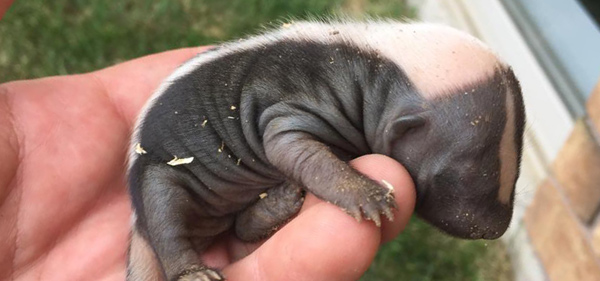- info@wildlife-removal.com
Call us for help in your town
Wildlife Removal Education
Do Baby Or Juvenile Skunks Spray?
Need skunk removal in your hometown? We service over 500 USA locations! Click here to hire us in your town and check prices - updated for year 2020.
The development of the ability to spray a foul smelling liquid is something that has evolved over thousands of years in skunks, and it is one of their most important defensive methods. Along with this, the white stripe along the back of the animal is a clear indication to potential predators that it is a skunk, and this will often deter animals who will go to look for easier victims. Therefore, it is natural to assume that skunks will develop this ability quite early in their development.

When Will Baby Skunks Be Old Enough To Spray
The ability to spray a potential threat is something that starts to develop early on in skunks, and certainly for those who have looked after domesticated baby skunks, the natural reaction to spray is something that is actually developed after only a few weeks. However, this does not mean that at that age they are able to control and direct their spray until they are much older, and in younger skunks this is more of a panic reaction rather than something targeted.
The Differences Between Sprayed By A Juvenile And An Adult Skunk
By the age of around three months skunks will have fully developed anal glands and will have the ability to spray, although one feature worth noting is that the older the skunk the better they will usually be at directing their spray. The key thing with an adult is that they can spray quite some distance, and are usually quite accurate over distances of up to ten feet, and will aim for the eyes and face of the animal or person that they view as a threat.
Should I feed a baby skunk I found?
What should I do if I find an orphaned baby skunk?
What should I do if I find a nest of baby skunks?
Can a skunk spray multiple times at once?
Signs A Skunk Is About To Spray
Skunks do not like to waste this foul smelling fluid however, so they will give the potential threat that they are intending to spray several other warning signs to encourage them to get away. This will include growling and hissing noises that the skunk will produce, along with stamping its feet and scratching the ground. If this is ineffective, then it will raise its tail and spray.
What To Do If You Are Sprayed
There are several traditional methods that are said to work to get rid of the smell produced by skunks, but in truth using tomato juice or citrus juices will rarely be effective. The smell is likely to be there for some time, but one recipe that can reduce the smell is to combine baking soda, 3% hydrogen peroxide and liquid dish soap and using this to wash the area.
Go back to the Skunk Removal page, or learn tips by reading How to get rid of skunks.


















